Yiming Du
Deep Incomplete Multi-View Clustering via Hierarchical Imputation and Alignment
Jan 14, 2026Abstract:Incomplete multi-view clustering (IMVC) aims to discover shared cluster structures from multi-view data with partial observations. The core challenges lie in accurately imputing missing views without introducing bias, while maintaining semantic consistency across views and compactness within clusters. To address these challenges, we propose DIMVC-HIA, a novel deep IMVC framework that integrates hierarchical imputation and alignment with four key components: (1) view-specific autoencoders for latent feature extraction, coupled with a view-shared clustering predictor to produce soft cluster assignments; (2) a hierarchical imputation module that first estimates missing cluster assignments based on cross-view contrastive similarity, and then reconstructs missing features using intra-view, intra-cluster statistics; (3) an energy-based semantic alignment module, which promotes intra-cluster compactness by minimizing energy variance around low-energy cluster anchors; and (4) a contrastive assignment alignment module, which enhances cross-view consistency and encourages confident, well-separated cluster predictions. Experiments on benchmarks demonstrate that our framework achieves superior performance under varying levels of missingness.
SWE-Lego: Pushing the Limits of Supervised Fine-tuning for Software Issue Resolving
Jan 07, 2026Abstract:We present SWE-Lego, a supervised fine-tuning (SFT) recipe designed to achieve state-ofthe-art performance in software engineering (SWE) issue resolving. In contrast to prevalent methods that rely on complex training paradigms (e.g., mid-training, SFT, reinforcement learning, and their combinations), we explore how to push the limits of a lightweight SFT-only approach for SWE tasks. SWE-Lego comprises three core building blocks, with key findings summarized as follows: 1) the SWE-Lego dataset, a collection of 32k highquality task instances and 18k validated trajectories, combining real and synthetic data to complement each other in both quality and quantity; 2) a refined SFT procedure with error masking and a difficulty-based curriculum, which demonstrably improves action quality and overall performance. Empirical results show that with these two building bricks alone,the SFT can push SWE-Lego models to state-of-the-art performance among open-source models of comparable size on SWE-bench Verified: SWE-Lego-Qwen3-8B reaches 42.2%, and SWE-Lego-Qwen3-32B attains 52.6%. 3) We further evaluate and improve test-time scaling (TTS) built upon the SFT foundation. Based on a well-trained verifier, SWE-Lego models can be significantly boosted--for example, 42.2% to 49.6% and 52.6% to 58.8% under TTS@16 for the 8B and 32B models, respectively.
Memory-T1: Reinforcement Learning for Temporal Reasoning in Multi-session Agents
Dec 23, 2025Abstract:Temporal reasoning over long, multi-session dialogues is a critical capability for conversational agents. However, existing works and our pilot study have shown that as dialogue histories grow in length and accumulate noise, current long-context models struggle to accurately identify temporally pertinent information, significantly impairing reasoning performance. To address this, we introduce Memory-T1, a framework that learns a time-aware memory selection policy using reinforcement learning (RL). It employs a coarse-to-fine strategy, first pruning the dialogue history into a candidate set using temporal and relevance filters, followed by an RL agent that selects the precise evidence sessions. The RL training is guided by a multi-level reward function optimizing (i) answer accuracy, (ii) evidence grounding, and (iii) temporal consistency. In particular, the temporal consistency reward provides a dense signal by evaluating alignment with the query time scope at both the session-level (chronological proximity) and the utterance-level (chronological fidelity), enabling the agent to resolve subtle chronological ambiguities. On the Time-Dialog benchmark, Memory-T1 boosts a 7B model to an overall score of 67.0\%, establishing a new state-of-the-art performance for open-source models and outperforming a 14B baseline by 10.2\%. Ablation studies show temporal consistency and evidence grounding rewards jointly contribute to a 15.0\% performance gain. Moreover, Memory-T1 maintains robustness up to 128k tokens, where baseline models collapse, proving effectiveness against noise in extensive dialogue histories. The code and datasets are publicly available at https://github.com/Elvin-Yiming-Du/Memory-T1/
ReSURE: Regularizing Supervision Unreliability for Multi-turn Dialogue Fine-tuning
Aug 27, 2025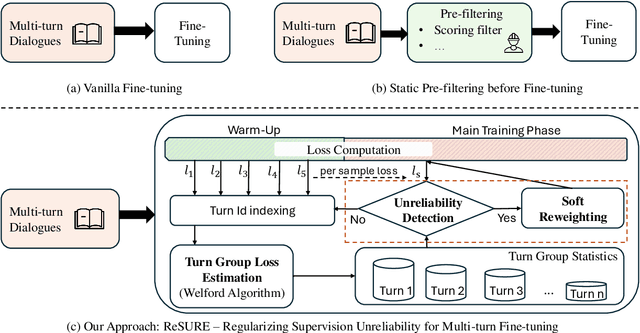



Abstract:Fine-tuning multi-turn dialogue systems requires high-quality supervision but often suffers from degraded performance when exposed to low-quality data. Supervision errors in early turns can propagate across subsequent turns, undermining coherence and response quality. Existing methods typically address data quality via static prefiltering, which decouples quality control from training and fails to mitigate turn-level error propagation. In this context, we propose ReSURE (Regularizing Supervision UnREliability), an adaptive learning method that dynamically down-weights unreliable supervision without explicit filtering. ReSURE estimates per-turn loss distributions using Welford's online statistics and reweights sample losses on the fly accordingly. Experiments on both single-source and mixed-quality datasets show improved stability and response quality. Notably, ReSURE enjoys positive Spearman correlations (0.21 ~ 1.0 across multiple benchmarks) between response scores and number of samples regardless of data quality, which potentially paves the way for utilizing large-scale data effectively. Code is publicly available at https://github.com/Elvin-Yiming-Du/ReSURE_Multi_Turn_Training.
Bridging the Long-Term Gap: A Memory-Active Policy for Multi-Session Task-Oriented Dialogue
May 26, 2025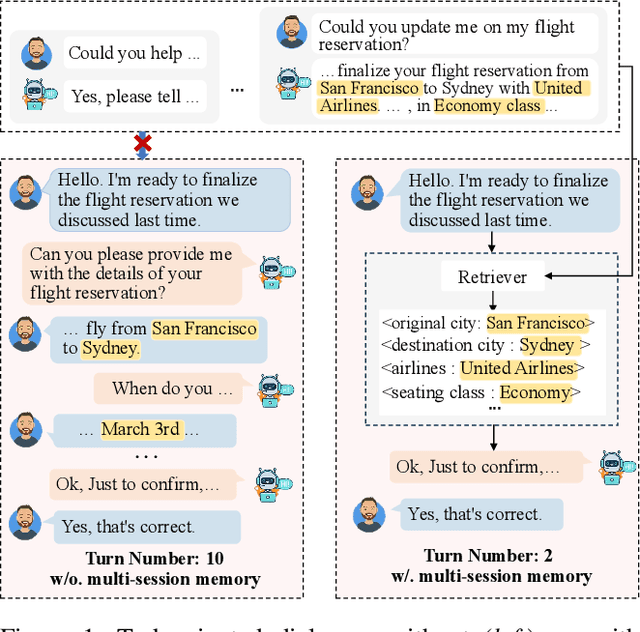
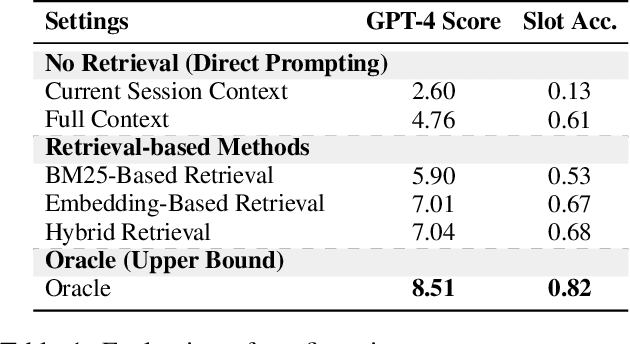
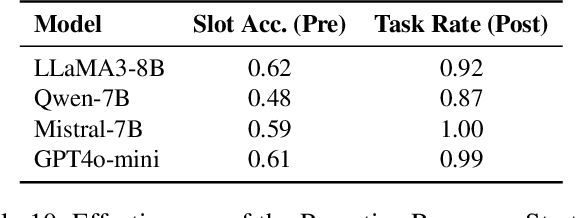
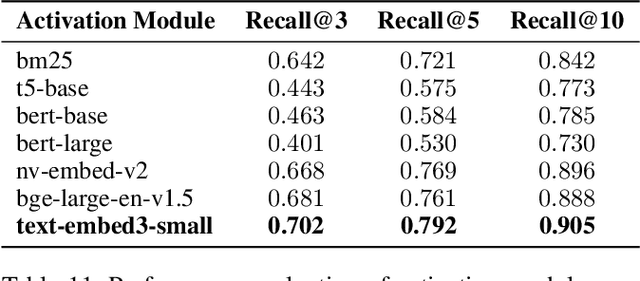
Abstract:Existing Task-Oriented Dialogue (TOD) systems primarily focus on single-session dialogues, limiting their effectiveness in long-term memory augmentation. To address this challenge, we introduce a MS-TOD dataset, the first multi-session TOD dataset designed to retain long-term memory across sessions, enabling fewer turns and more efficient task completion. This defines a new benchmark task for evaluating long-term memory in multi-session TOD. Based on this new dataset, we propose a Memory-Active Policy (MAP) that improves multi-session dialogue efficiency through a two-stage approach. 1) Memory-Guided Dialogue Planning retrieves intent-aligned history, identifies key QA units via a memory judger, refines them by removing redundant questions, and generates responses based on the reconstructed memory. 2) Proactive Response Strategy detects and correct errors or omissions, ensuring efficient and accurate task completion. We evaluate MAP on MS-TOD dataset, focusing on response quality and effectiveness of the proactive strategy. Experiments on MS-TOD demonstrate that MAP significantly improves task success and turn efficiency in multi-session scenarios, while maintaining competitive performance on conventional single-session tasks.
Rethinking Memory in AI: Taxonomy, Operations, Topics, and Future Directions
May 01, 2025Abstract:Memory is a fundamental component of AI systems, underpinning large language models (LLMs) based agents. While prior surveys have focused on memory applications with LLMs, they often overlook the atomic operations that underlie memory dynamics. In this survey, we first categorize memory representations into parametric, contextual structured, and contextual unstructured and then introduce six fundamental memory operations: Consolidation, Updating, Indexing, Forgetting, Retrieval, and Compression. We systematically map these operations to the most relevant research topics across long-term, long-context, parametric modification, and multi-source memory. By reframing memory systems through the lens of atomic operations and representation types, this survey provides a structured and dynamic perspective on research, benchmark datasets, and tools related to memory in AI, clarifying the functional interplay in LLMs based agents while outlining promising directions for future research\footnote{The paper list, datasets, methods and tools are available at \href{https://github.com/Elvin-Yiming-Du/Survey_Memory_in_AI}{https://github.com/Elvin-Yiming-Du/Survey\_Memory\_in\_AI}.}.
EventWeave: A Dynamic Framework for Capturing Core and Supporting Events in Dialogue Systems
Mar 29, 2025Abstract:Existing large language models (LLMs) have shown remarkable progress in dialogue systems. However, many approaches still overlook the fundamental role of events throughout multi-turn interactions, leading to \textbf{incomplete context tracking}. Without tracking these events, dialogue systems often lose coherence and miss subtle shifts in user intent, causing disjointed responses. To bridge this gap, we present \textbf{EventWeave}, an event-centric framework that identifies and updates both core and supporting events as the conversation unfolds. Specifically, we organize these events into a dynamic event graph, which represents the interplay between \textbf{core events} that shape the primary idea and \textbf{supporting events} that provide critical context during the whole dialogue. By leveraging this dynamic graph, EventWeave helps models focus on the most relevant events when generating responses, thus avoiding repeated visits of the entire dialogue history. Experimental results on two benchmark datasets show that EventWeave improves response quality and event relevance without fine-tuning.
MlingConf: A Comprehensive Study of Multilingual Confidence Estimation on Large Language Models
Oct 16, 2024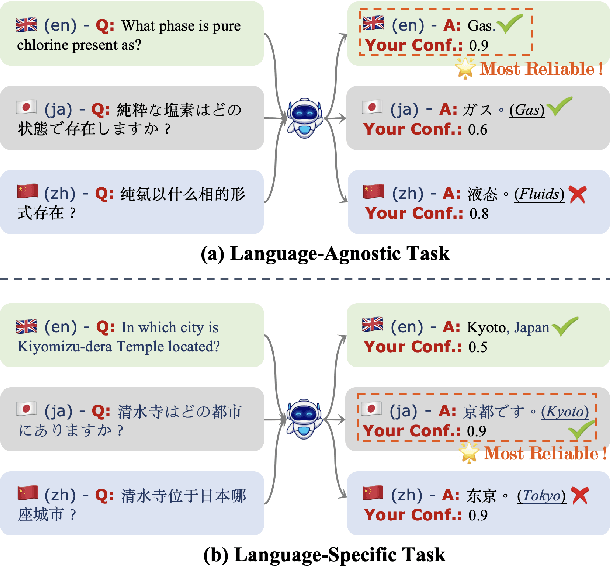


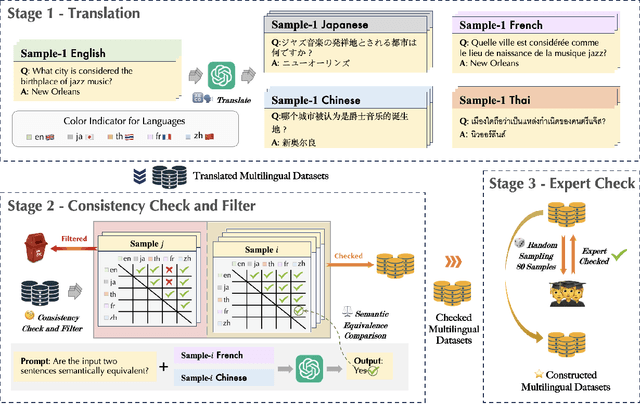
Abstract:The tendency of Large Language Models (LLMs) to generate hallucinations raises concerns regarding their reliability. Therefore, confidence estimations indicating the extent of trustworthiness of the generations become essential. However, current LLM confidence estimations in languages other than English remain underexplored. This paper addresses this gap by introducing a comprehensive investigation of Multilingual Confidence estimation (MlingConf) on LLMs, focusing on both language-agnostic (LA) and language-specific (LS) tasks to explore the performance and language dominance effects of multilingual confidence estimations on different tasks. The benchmark comprises four meticulously checked and human-evaluate high-quality multilingual datasets for LA tasks and one for the LS task tailored to specific social, cultural, and geographical contexts of a language. Our experiments reveal that on LA tasks English exhibits notable linguistic dominance in confidence estimations than other languages, while on LS tasks, using question-related language to prompt LLMs demonstrates better linguistic dominance in multilingual confidence estimations. The phenomena inspire a simple yet effective native-tone prompting strategy by employing language-specific prompts for LS tasks, effectively improving LLMs' reliability and accuracy on LS tasks.
PerLTQA: A Personal Long-Term Memory Dataset for Memory Classification, Retrieval, and Synthesis in Question Answering
Feb 26, 2024Abstract:Long-term memory plays a critical role in personal interaction, considering long-term memory can better leverage world knowledge, historical information, and preferences in dialogues. Our research introduces PerLTQA, an innovative QA dataset that combines semantic and episodic memories, including world knowledge, profiles, social relationships, events, and dialogues. This dataset is collected to investigate the use of personalized memories, focusing on social interactions and events in the QA task. PerLTQA features two types of memory and a comprehensive benchmark of 8,593 questions for 30 characters, facilitating the exploration and application of personalized memories in Large Language Models (LLMs). Based on PerLTQA, we propose a novel framework for memory integration and generation, consisting of three main components: Memory Classification, Memory Retrieval, and Memory Synthesis. We evaluate this framework using five LLMs and three retrievers. Experimental results demonstrate that BERT-based classification models significantly outperform LLMs such as ChatGLM3 and ChatGPT in the memory classification task. Furthermore, our study highlights the importance of effective memory integration in the QA task.
A Survey of the Evolution of Language Model-Based Dialogue Systems
Nov 28, 2023



Abstract:Dialogue systems, including task-oriented_dialogue_system (TOD) and open-domain_dialogue_system (ODD), have undergone significant transformations, with language_models (LM) playing a central role. This survey delves into the historical trajectory of dialogue systems, elucidating their intricate relationship with advancements in language models by categorizing this evolution into four distinct stages, each marked by pivotal LM breakthroughs: 1) Early_Stage: characterized by statistical LMs, resulting in rule-based or machine-learning-driven dialogue_systems; 2) Independent development of TOD and ODD based on neural_language_models (NLM; e.g., LSTM and GRU), since NLMs lack intrinsic knowledge in their parameters; 3) fusion between different types of dialogue systems with the advert of pre-trained_language_models (PLMs), starting from the fusion between four_sub-tasks_within_TOD, and then TOD_with_ODD; and 4) current LLM-based_dialogue_system, wherein LLMs can be used to conduct TOD and ODD seamlessly. Thus, our survey provides a chronological perspective aligned with LM breakthroughs, offering a comprehensive review of state-of-the-art research outcomes. What's more, we focus on emerging topics and discuss open challenges, providing valuable insights into future directions for LLM-based_dialogue_systems. Through this exploration, we pave the way for a deeper_comprehension of the evolution, guiding future developments in LM-based dialogue_systems.
 Add to Chrome
Add to Chrome Add to Firefox
Add to Firefox Add to Edge
Add to Edge